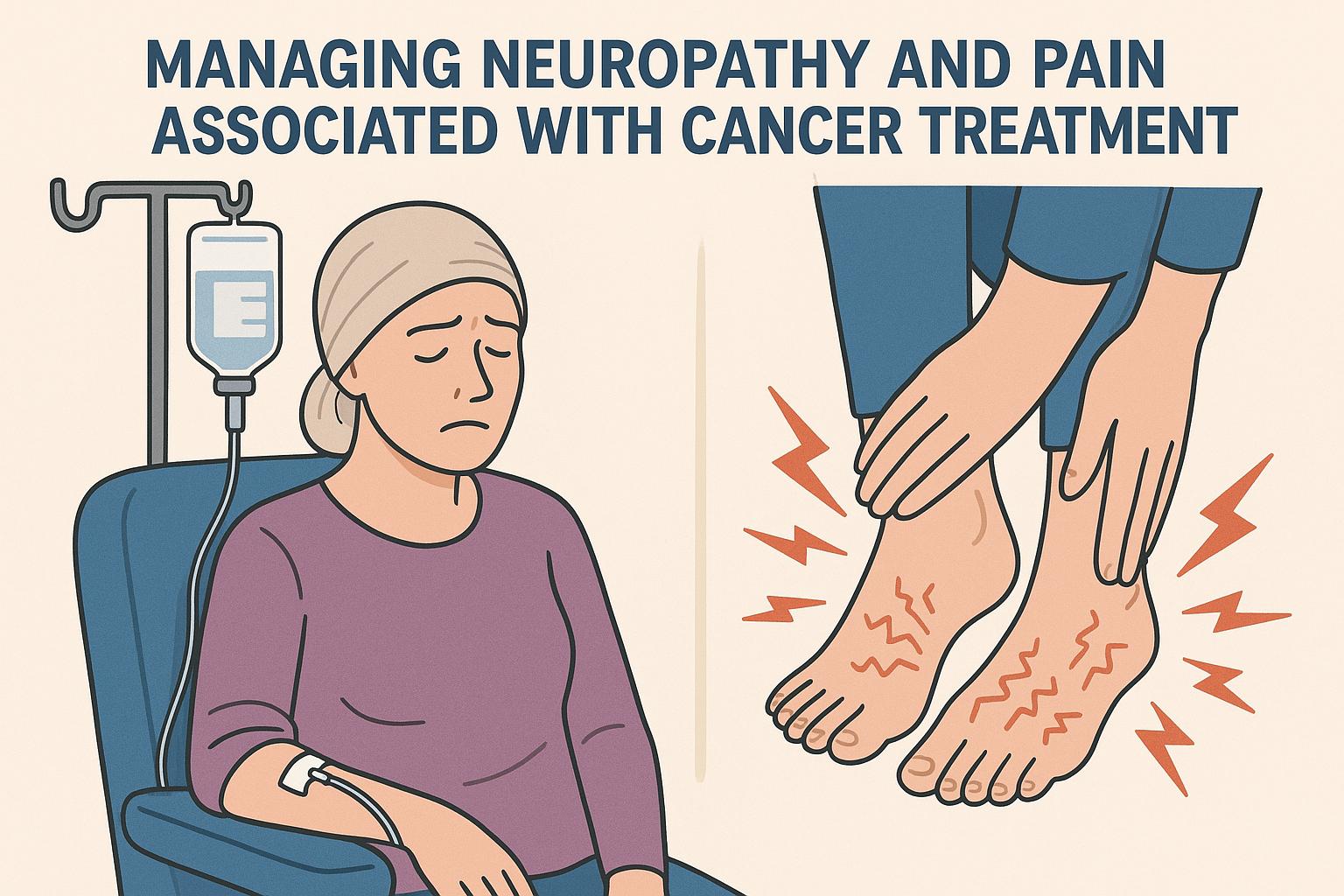Understanding Neuropathy from Cancer Treatment
Cancer treatment is essential in fighting malignancies, aiming for remission or cure. Nevertheless, it comes with a spectrum of side effects that can significantly affect the quality of life of those undergoing treatment. One such debilitating side effect is neuropathy.
Neuropathy involves damage to the peripheral nerves, which are responsible for transmitting signals between the central nervous system and the rest of the body. When these nerves are damaged, it can lead to a range of symptoms. This condition is particularly relevant for cancer patients, as neuropathy can compound the challenges they already face due to their illness and treatment.
Causes of Neuropathy in Cancer Patients
For cancer patients, one of the most frequent culprits behind neuropathy is chemotherapy. Chemotherapy uses potent drugs to target and kill cancer cells, but these drugs can also harm healthy cells, including nerve cells, leading to neuropathy. Among the chemotherapeutic agents, those in the platinum-based categories (such as cisplatin), taxanes (like paclitaxel), and vinca alkaloids (vincristine, for example) are notorious for inducing nerve damage. The damage brought on by these drugs disrupts the normal functioning of peripheral nerves, manifesting in symptoms typically associated with peripheral neuropathy.
Additionally, other aspects of cancer and its treatment may contribute to neuropathy. For instance, radiation therapy, especially when directed near nerve pathways, can cause nerve damage. Similarly, surgical procedures involving nerve-rich areas may also inadvertently lead to neuropathy.
Symptoms of Neuropathy
The symptoms of neuropathy can vary significantly from one individual to another, depending largely on the nerves affected. However, there are some common signs and symptoms that many individuals experience. It often begins with mild discomfort but can progress to more severe manifestations:
- Tingling and numbness in the extremities: Patients often report a sensation akin to “pins and needles” in the hands and feet.
- Burning or shooting pain: This can be especially distressing and may not always respond well to conventional pain relief methods.
- Muscle weakness: As the nerves that supply muscles are affected, patients might notice a decrease in muscle strength.
- Sensitivity to touch: Even light touch or pressure can cause significant discomfort or pain.
These symptoms can potentially become severe, significantly impacting daily activities, independence, and overall well-being. Reduced dexterity or impaired balance due to muscle weakness and sensory loss can increase the risk of falls. Everyday tasks, like buttoning a shirt, walking, or handling objects, may become challenging or even impossible in severe cases.
Managing Neuropathy
Managing neuropathy effectively often requires a comprehensive, multidisciplinary approach. This involves not just addressing the nerve pain itself but also supporting the patient’s overall health and quality of life.
Medications: Several medications may be prescribed to help alleviate neuropathic pain. Anticonvulsants such as gabapentin and pregabalin are commonly used, as they can dampen excessive nerve signaling. Antidepressants may help by altering the chemical signals in the brain, notwithstanding their name, and topical treatments, such as lidocaine patches, can provide local pain relief. It’s critical for patients to have an open dialogue with their healthcare provider to navigate the side effects and potential benefits of these medications to find the most suitable treatment for their condition.
Physical Therapy: Physical therapy can play a crucial role by helping patients regain or maintain strength, coordination, and range of motion. Therapists might focus on exercises tailored to improve mobility, reduce pain, and even prevent potential injuries due to imbalance or weakness. They can also offer guidance on using assistive devices to promote safety and independence.
Lifestyle Modifications: Patients can make various lifestyle adjustments that may help in managing the symptoms:
- Wearing supportive footwear to protect feet from injury and provide stability.
- Avoiding activities that could exacerbate nerve damage, like repetitive motions or exposure to cold that can aggravate symptoms.
- Incorporating a balanced diet rich in vitamins known to support nerve health—like B vitamins and antioxidants—can be beneficial.
Alternative Therapies
Alternative and complementary therapies, while not a replacement for conventional medical treatment, can offer additional relief to some patients. Acupuncture, with its roots in traditional Chinese medicine, involves the insertion of thin needles into specific points on the body and has been reported by some to help alleviate nerve pain. Massage therapy can also be effective in reducing pain and promoting relaxation, though its effectiveness may vary from patient to patient.
It’s critical for patients to consult with their healthcare providers before commencing any new treatment, ensuring that it is safe and appropriate, given their overall medical situation. Careful integration of these therapies into the broader treatment plan may optimize their benefits while minimizing risks.
Dealing with neuropathy involves ongoing communication with healthcare providers to tailor a plan that effectively manages symptoms, optimizes daily functioning, and supports overall health during and after cancer treatment. Continual reassessment of symptoms and response to treatments allows for timely adjustments in care strategies, ensuring that the approach remains aligned with the patient’s evolving needs.
For more detailed information on neuropathy and potential treatment options, you may find resources from the American Cancer Society particularly useful. Consider visiting their website for more insights: American Cancer Society. Engaging with these resources can empower patients and caregivers with knowledge to make informed decisions regarding care and management strategies.
In conclusion, while neuropathy resulting from cancer treatment poses significant challenges, a well-coordinated approach involving medical treatment, therapy, lifestyle changes, and possibly alternative therapies can manage the symptoms and enhance quality of life. Through collaboration with healthcare providers and leveraging reliable information resources, patients can navigate this aspect of their cancer journey with greater confidence and support.
This article was last updated on: November 19, 2025

